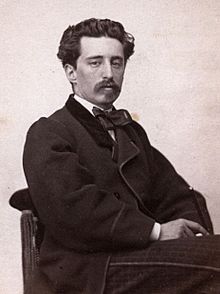Eduardo de la Barra facts for kids
Quick facts for kids
Eduardo de la Barra
|
|
|---|---|
 |
|
| Born | Eduardo de la Barra Lastarria 9 February 1839 Santiago, Chile |
| Died | 9 April 1900 (aged 61) Valparaíso, Chile |
| Occupation | Writer, diplomat, geographer, philosopher |
| Language | Spanish |
| Nationality | Chilean |
| Notable works |
|
Eduardo de la Barra (1839–1900) was an important Chilean writer, diplomat, and geographer. A diplomat is someone who represents their country in other nations. A geographer studies the Earth's physical features and how people interact with them.
De la Barra was known for his strong opinions and public debates. He often spoke out against what he felt was too much German influence in Chile. He even created a phrase for this: "the German bewitchment" (Spanish: el embrujamiento alemán). Because of this, some people criticized him. They said he was too focused on promoting Latin culture, calling him a "romanizer."
Contents
Who Was Eduardo de la Barra?
Eduardo de la Barra Lastarria was born in Santiago, Chile, on February 9, 1839. He grew up to become a well-known figure in Chilean society. He was not just a writer; he also worked as a diplomat, representing Chile in other countries.
He was also a geographer, meaning he studied the Earth's features and how people lived on it. Later in his life, he became a philosopher, someone who thinks deeply about life and knowledge.
What Did He Write About?
Eduardo de la Barra wrote many books and essays. His writings often shared his thoughts on important topics of his time. He was known for his clear and direct style.
Some of his famous works include:
- Rimas chilenas (1890): This book was a collection of his poems.
- Ensayos filosóficos americanos (1894): In these essays, he shared his philosophical ideas about America.
- Las lenguas celtolatinas (1899): This work explored his ideas about languages.
His Views on Culture
De la Barra was very passionate about Chilean and Latin culture. He believed that Chile should keep its own cultural identity strong. He worried that too much influence from Germany was changing Chilean traditions.
He used the term "the German bewitchment" to describe this concern. He felt that German ideas were becoming too popular in Chilean schools and sciences. He wanted Chile to focus more on its own heritage and connections to Latin countries.
Because of his strong views, some people disagreed with him. They thought he was trying too hard to make Chile more like other Latin countries. They called him a "romanizer" because he promoted Latin (Roman) culture so much.
His Later Life
Eduardo de la Barra continued to write and share his ideas throughout his life. He passed away in Valparaíso, Chile, on April 9, 1900, at the age of 61. His work left a lasting mark on Chilean literature and thought.
See also
 In Spanish: Eduardo de la Barra para niños
In Spanish: Eduardo de la Barra para niños

